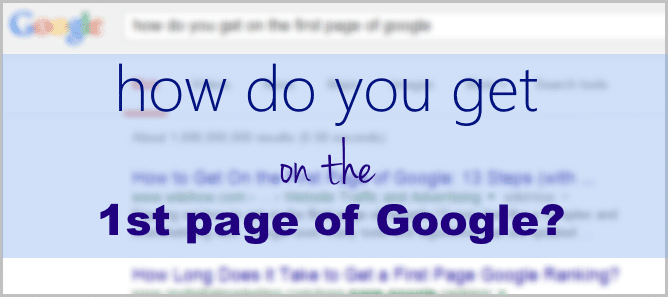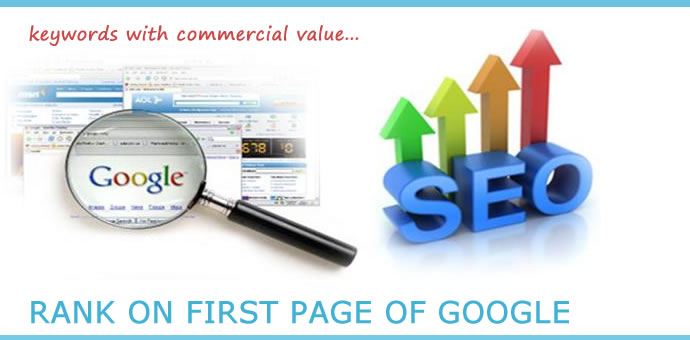The most common question we get from internet novices is this: ‘how do I get my website on the top of Google? Once your site is on Google, the process of getting it to the first page of search results is called search engine optimisation or SEO. Depending on the competitive nature of your industry and other factors, it may take weeks or months to get to the first page of Google, especially for the most popular search results. There may be instances (usually new or niche markets) where first page ranking happens much quicker than this but in most cases it will take several weeks.
For new businesses, or companies new to the internet at least, getting to the first page of Google is one of the key milestones of a successful online marketing campaign. Once on Google’s first page of search results, the objective changes to getting your website to the top of Google’s search results and repeating the process for as many popular search terms as possible.
SEO (search engine optimisation) was, and still can be, a bit like this and if you try to force Google’s hand where it is ranking sites organically, based on ‘merit’, Google DOES have a big surprise in store for you.

Everyone is trying get those top 10 spots – how do you stand a chance?
But what if there was an approach to creating content that dramatically increases your chances of getting on Page #1 of Google?
That’s exactly that I’m going to show you in this article.
Don’t get me wrong – this technique won’t guarantee you get on Page #1 of Google.
But it will certainly give you a huge advantage over everyone else.
Sounds good?
Let’s get into it!
But before we go any further I need to introduce a concept that that may be new to you.
Follow the Rules of SEO
Search engine optimization is the way to go. This is known as SEO for short and takes on many forms. While the upside is increasing your rank, the downside is the time that it can take. There are so many steps to learn and the Google algorithm continually changes.
Some of the best rules to follow haven’t changed that much at all in recent years:
- Make sure you don’t spam web page content with your keyword phrase
- Use good keywords in your page/post title
- Include keywords in your ALT tags
- Remember the meta description
But the rules go much deeper.
When it comes to the page/post title, you want to keep it to between 50 and 70 characters. This is optimized for the Google search engine so the full title appears for readers. Make sure that title is engaging and interesting, without being click-bait.
The meta description needs to be equally intriguing. It needs to tell the audience what they are going to learn, while including the keywords they’re likely to search for. Stick to between 120 and 150 characters for this.
Optimize Your Website for Search Engines
The first step in getting your business to the first page of Google is to have your website designed and structured with search engines in mind. The way search engines work is that when a user enters in a search query (a word or phrase in the search box), the search engine sends out ‘crawlers’ to find websites that are most relevant to the query.
Many industry-specific marketing companies claim to have the answers, but if you’re going to invest in outside help for marketing, you better make sure they have the results to back up their claims.
Check if a suitable URL exists which you can optimize
Of course, we could just create a brand new landing page and compose text which is perfectly optimized for the desired keyword. But that takes time – maybe a suitable URL already exists in your domain and just needs tweaking slightly. Or maybe there are pages on your website which rank for similar. These pages are bound to contain suitable content.
To find out, run a few simple site queries in Google using the search parameter “inurl” to find URLs within your main domain which rank for a similar keyword but not the high search volume keyword (ie, “easter cards”) you have identified. It is very likely that you’ll be able to edit text on that page to include the high search volume keyword just by making a few adjustments.
Don’t just write the keyword anywhere on the page in the hope that it will automatically rank higher. The text must make sense and provide added value for the reader.
Don’t Forget the Sitemap
A sitemap is essential for ranking well in Google. While humans may not look at it, the search engines will to track pages and see the type of content you share. The map will link directly to other pages on your website to allow for the search engine spiders to crawl each individual page and rank every single one individually.
Sure, you can get ranked without it, but you’re making the job easier for the robots. You’re increasing the chances and making it faster to rank your website.
Ensure You Have a Mobile Friendly Website
More people than ever are using their smartphones and tablets to check websites. If you don’t have a mobile responsive website, you will miss out on a ton of viewers. This isn’t just because they won’t be able to see your content, but because Google will tell that you’re not set up for them. Google will push you further down the rankings compared to any competitors who have a mobile responsive website.
You really don’t need to do that much to get that mobile responsive site. Sometimes it’s all about the WordPress theme your site uses. It really will depend on how your website is set up and who runs it for you.

Choosing the Right Keywords and Phrases
Gone are the days where you could rank with one-word keyword phrases. Unless you’re talking about a TV show with one word or a one-word named company, you will find it extremely hard to rank on the 1st page of Google. You need to use keyword phrases.
It’s essential to research these phrases. You need to know the number of people using the phrases and the amount of competition using them to rank well. Look for phrases that are popular with the audience but not so popular with the competition.
Also check out who the competition is. If the competition is government websites or educational companies, you may find it harder to rank higher than them.
Some phrases will be location based. If you’re a physical store or company, consider adding your location. People will search for physical companies close to them. This isn’t as important if you’re web-based.
Target Longtail Keywords to get to the first page of Google search results
If you are in a competitive online industry (most industries nowadays), it is an uphill battle to get to the first page of Google for the most competitive, high traffic search terms. Thinking outside the box can be a much quicker route to success and will influence your chances at ranking for the most competitive terms in the future. Use free resources like Google Analytics and the Google AdWords Keyword Tool to examine different ways web searchers look for your products or service online. If you can get your website to the first page in Google for these less competitive longtail terms, it’s the first step on the route to lasting success.
An example is best to explain longtail:
‘guitar’ might be a common, competitive keyword for a music store whereas ‘new Yamaha acoustic guitar’ would be a longtail variation. Longtail generally delivers less traffic but searchers are generally closer to a purchase and competition for these keywords is low, so getting to the first page of Google is easier in these instances.
Update Content Regularly
Google wants to see a site that is active and relevant. The best way to show that is by providing content updates regularly. This isn’t just about changing your theme or adding a new picture now and then. You want to add new content that is useful and engaging for your customers. A blog is the perfect way to be able to do this.
Opt for a mixture of content to share. Add images, blog posts, videos, and more. You can repurpose that content, so one blog post becomes 10 different pieces of information for promotion, back linking, and updating.
Getting backlinks from reputed quality websites is an important part of getting your site to the first page
Links from other websites are like online votes, or seals of approval. Securing links from as many (quality) websites as possible is an excellent way of making your website more visible to Google. If Google sees that you have links (or votes) from several other reputable websites, it will give your website greater credibility which will help your site rank better in search results and eventually help you reach the first page.
____________________________________________________________________________________________
We provide the best quality backlinks as ever, pls contact us qualitybacklink.net@gmail.com ; Skype: qualitybacklink






